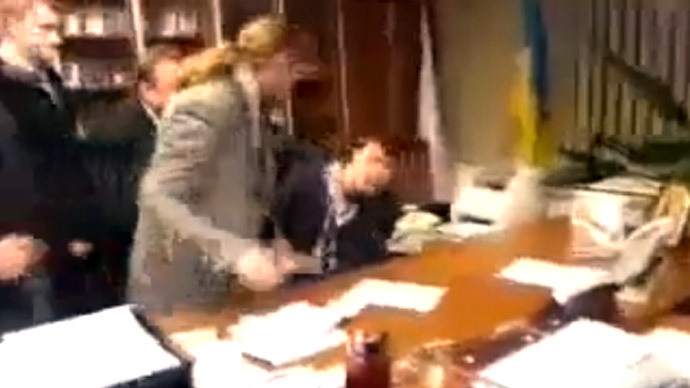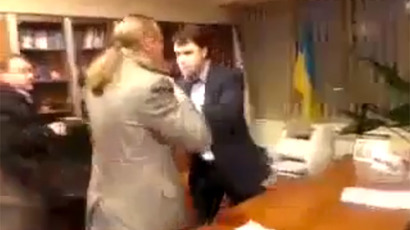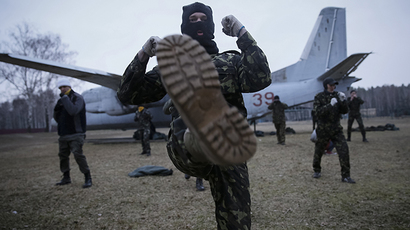Rights groups condemn Ukrainian nationalist MPs’ beating of media chief

Rights and media professionals groups condemned an attack by Ukrainian MPs on the acting head of national TV. The attackers leader justified the action by “circumstances of war” while the General Prosecutor’s office pledged to conduct an impartial probe.
On Tuesday, several members of the Ukrainian parliament from the nationalist Svoboda party, headed by MP Igor Miroshnichenko, came with a group of supporters to the office of acting head of Ukrainian national television, Aleksandr Panteleymonov. The assailants insulted and bullied the journalist, eventually forcing him to sign his resignation.
The nationalist lawmakers’ ire was caused by the TV station reporting on a ceremony in Moscow, where the leadership of Russia and Crimea signed a treaty on the former Ukrainian region’s joining the Russian Federation. Miroshnichenko cited his membership in the parliamentary Committee on freedom of speech as justification for the attack.
“It is astonishing that a member of the parliamentary committee on freedom of speech was involved in this attack. The acting authorities must send a signal that this sort of behavior will not be tolerated in Ukraine,” said Heather McGill, Ukraine researcher at Amnesty International.
“This assault on freedom of expression must be immediately investigated and those responsible must be prosecuted. Anything less will only open the door to further attacks against media professionals and activists,” she added.
Similar condemnation came from Reporters Without Borders. The organization said the incident “entails lifting the parliamentary immunity of the legislators involved. And one of them, Igor Miroshnichenko, cannot continue to be a member of the parliamentary committee on freedom of expression and information.”
“Journalists must not be held hostage to the conflict between Russia and Ukraine. They must be able to work in an impartial manner, refraining from any propaganda or disinformation, and without being forced to rally to the flag of any of the parties to the conflict,” said Johann Bihr, head of the Reporters Without Borders Eastern Europe and Central Asia desk.
The attack on freedom of speech in Kiev was also condemned by the Organization of Security and Cooperation in Europe, which noted that it was not the first attack on the media after the change of power in Kiev.
The Ukrainian General Prosecutor’s office has launched a preliminary investigation into the attack and may pursue charges of hooliganism and hindering the professional work of journalists, acting General Prosecutor Olek Makhnitsky announced on Wednesday.
Makhnitsky is in tricky situation over the incident, being a fresh appointee from the same Svoboda party, although he was obliged to resign his membership to take the office. He stressed that the investigation would not be affected by party allegiances.
His office “no longer executes anyone’s orders, as it used to do [under President Yanukovich – RT]. It acts for the people and to uphold the law,” he pledged.
Another tricky part is that members of parliament in Ukraine have immunity from prosecution, and those involved in the attack do not appear to be eager to relinquish it.
“We probably acted out of line and we are sorry about it. We acted out of emotion. But there was no beating or any abuse despite what the journalists reported,” Miroshnichenko stated at a media briefing in Kiev on Wednesday.
His words however contradict what the footage of the assault shows (the beating on the video starts at 4:40). Medics, who examined Panteleymonov after the incident, confirmed that his nose was broken.
“We are not hiding behind our immunity. We are prepared for relevant structures and government bodies to conduct an unbiased investigation,” Miroshnichenko added.
He also spoke to a protest rally in Kiev, which demanded that the nationalists were held accountable for the incident, to justify the attack.
“I admit, I probably went too far. But in the circumstances of war it is obvious that that man had to be sacked immediately,” he said.
Some Ukrainians believe that Svoboda may have taken such radical steps to strengthen its support among more radical voters. Their loyalty has been seeping to the radical Right Sector group, which evolved from a fringe marginal movement to a prominent political force during the unrest in Kiev.














